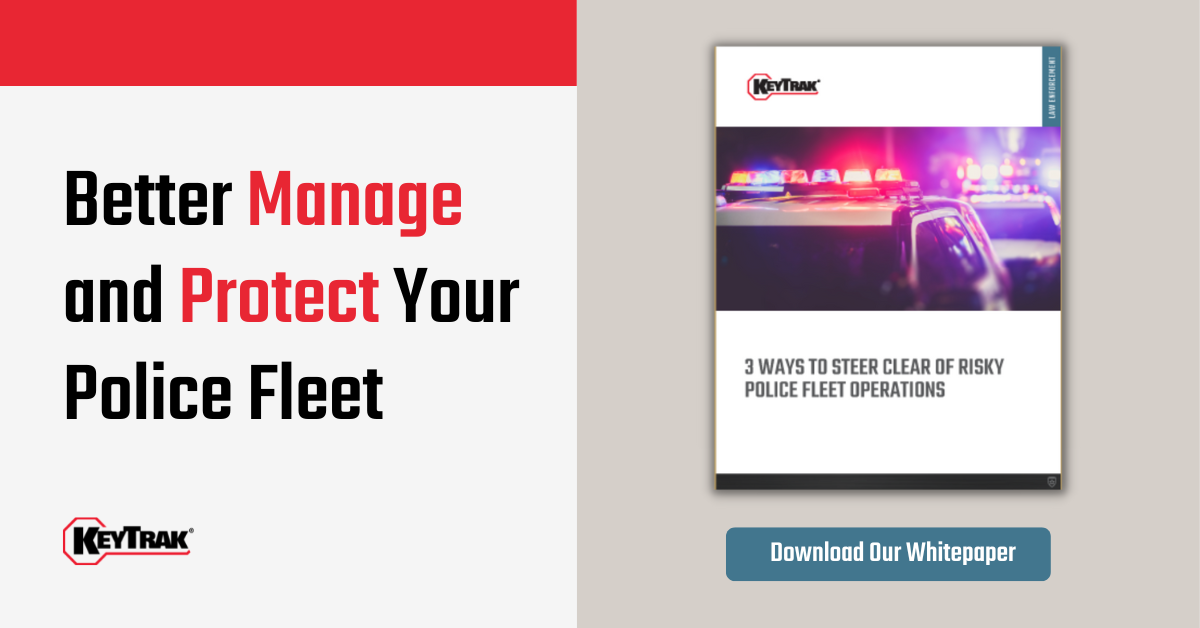Budget cuts. Vehicle shortages. Escalating maintenance costs. Police fleets nationwide are dealing with these challenges and more. In the current environment, there’s no room for manual processes, delayed maintenance, or unauthorized vehicle use.
As a fleet manager, you’re often tasked with coming up with workarounds to the challenges you face. Here are three common issues you can solve — all by rethinking how you manage your fleet keys..png?width=750&height=313&name=Police%20Fleet%20Issues%20(2).png)
Inefficient Pool Car Checkout
In the UK, a police force came under investigation for operational issues, including complaints that “officers are often left in stations waiting for keys for a car.” Think about your own process for checking out pool vehicles. Where are the bottlenecks in your process? Here are a few common reasons for delays:
Manual Processes
Do you manually complete a logbook or spreadsheet when issuing or returning keys? Not only is this process time-consuming, but also it’s easy to make a mistake when recording details about key transactions.
Off-Hours Replacement Vehicles
If an officer needs a replacement vehicle mid-shift due to their vehicle breaking down or becoming soiled and you’re off work, do you have to make a special trip into the station to check out a new vehicle to the officer? If they’re waiting around on a vehicle, they’re unable to return to patrol in a timely manner.
Late Key Return
When a key isn’t returned on time, how long does it take for you to realize it and locate the missing key? These types of issues interfere with the fleet’s availability and the department’s overall efficiency.
Instead, consider a self-serve checkout system to avoid delays. With an electronic key control system, officers can check out keys for a new vehicle quickly without compromising security and without requiring you to be there. The system will automatically record who removed which keys and when, so your records are up to date.
In addition, if an officer doesn’t return a key at the end of their shift, you can receive an automatic text or email notification. That way, you can follow up with the officer to ensure the key is safely returned.
Limited Resources
With supply chain issues affecting vehicle production, you’re likely having to get creative to ensure there are enough vehicles available to officers. For example, one fleet manager hunted down what were possibly the last three new patrol vehicles in Texas after a vehicle manufacturer was only able to provide one of the four vehicles the department had ordered. In Georgia, some jurisdictions attempted to piggyback on other states’ vehicle orders to move ahead of the line.
Of course, not all departments have the budget for new vehicles. Those that have experienced budget cuts are forced to extend the life of high-mileage vehicles.
To maintain the readiness rates of aging vehicles you’re unable to replace — whether due to supply shortages, budget limitations, or both — a tightly run maintenance schedule is a must. Without it, you risk finding yourself in the same situation as the UK police force mentioned earlier, which reportedly had cars out of commission for long periods of time due to mechanical issues.
Using an electronic key management system helps you maintain an efficient maintenance schedule by prompting users to enter vehicle mileage when they return a key. With that information, you can tell at a glance when a vehicle is approaching a service milestone. To take vehicles out of the rotation for service, you can reserve keys ahead of time.
Stolen Vehicles
With vehicles being such a precious commodity, consider how a lost or stolen key or patrol car would affect your fleet. Beyond that, think about how it would affect the public’s safety and your department’s reputation. Here are a few examples of what can happen when keys and vehicles aren’t secured:
- In Colorado, a man broke into a substation, located the keys for a patrol vehicle, and responded to a call he heard over the police radio. When deputies arrived, the man sped off, leading officers in a high-speed chase before crashing the vehicle.
- In Massachusetts, police responded to a crash involving a stolen cruiser. The driver fled, but police later arrested four teens, one of whom had the key to the wrecked cruiser.
- In Pennsylvania, a woman took a police cruiser for a joy ride after a patrol vehicle was parked in front of the police station with the keys in the ignition and the doors unlocked.
If your fleet isn’t secure, repairing or replacing vehicles might be the least of your worries. In all three of these examples, citizens’ lives were endangered due to the suspects’ erratic driving.
If your fleet isn’t secure, repairing or replacing vehicles might be the least of your worries.
To prevent keys and vehicles from being lost, stolen, or misused, secure them in an electronic system with locking steel drawers or wall-mounted panels that lock down each key. Only authorized users can remove keys, so you won’t have to worry about an unauthorized person swiping a key and taking off in a patrol vehicle.
By digitizing your key control, you can ensure vehicles are available when needed and secure when they’re not. Save time, stay on top of maintenance, and protect your fleet.



